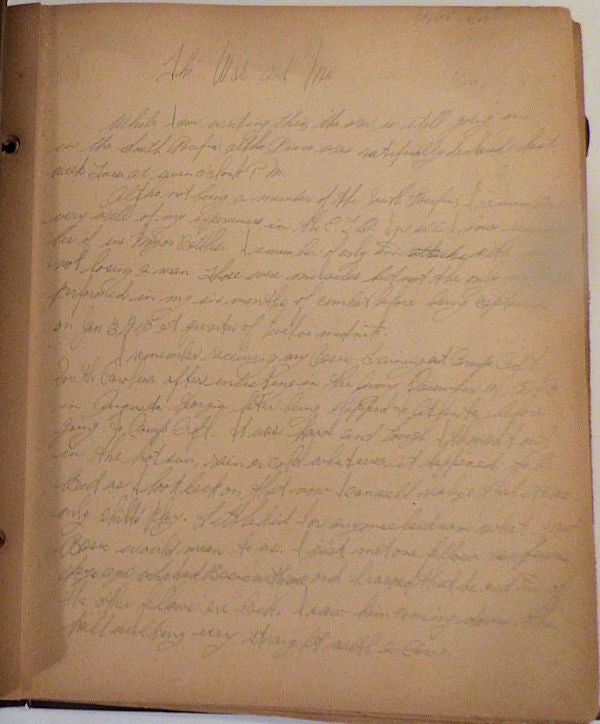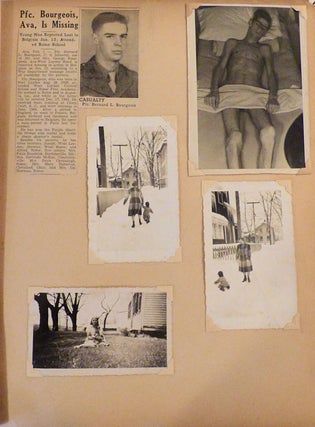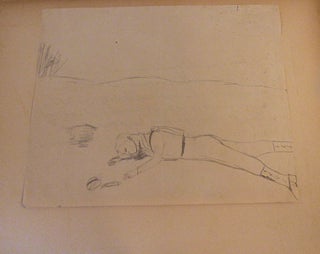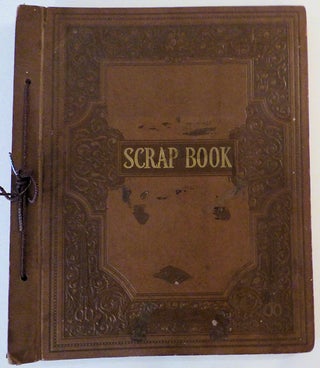World War II American prisoner of war’s handwritten memoir-journal and photograph album.
U.S. Army Rhodes General Convalescent Hospital at Utica, New York: 1945. This large 12" x 14" album contains 38 pages filled with text and photographs. Ten pages contain Bourgeois's densely filled, pencil-written memoir-journal describing in detail his combat and prisoner experience Europe during World War Two. Three pages contain military-related sketches, one a tipped-in drawing of a comrade lying dead on the ground. The remaining pages contain mostly pre and post-war photographs. Two of the photographs show the same image, Bourgeois lying nearly naked in a hospital bed probably taken soon after his liberation. There is also a newspaper clipping, probably saved by his parents, reporting that he was missing in action. The album is soiled and edge-worn. The leaves are brittle and beginning to crumble at the margins. The text is faint but legible. Most of the photographs are in nice shape; one of the hospital photographs, which is glued inside the front cover is badly worn.
This is a compelling World War II diary-memoir written by a young infantryman while convalescing after his liberation from Stalag 11B where he had been imprisoned following his capture during the Battle of the Bulge. In it, he describes the horrendous combat he faced after landing at Normandy and the savage treatment and execution of American soldiers by their German captors.
Excerpts include:
"We crept along hedge row after hedge row . . . and it wasn't long before the Heines started shooting at us. We finally took our objective but no sooner were settling down for the night when we got a counter attack which the jerries were noted for. 88's pounded in on us and all we could do was to stay and take it. . . . There were three left of us in my squad besides the sergeant. The sergeant was later killed by a direct mortar shell. . . . It was my Baptism of Fire. . . My first buddie was killed when we both ducked an incoming 88. He lay no more than six inches away from me. I had spoken to him after the 88, I looked up to finish my sentence but he did not raise his head. There was a large gushing stream of blood coming from the left side of his neck. As fear gripped me, I started to run back, but my sergeant stopped me and bawled me out saying, "only cowards run. . . . And so it went on for days. . . .
Then it was August fifth of 44 when we attacked Mountain Hill for which we got a special medal. We took it without difficulty. The Germans let us, for next day when we went up the hill we were quickly surrounded. The Germans were clever and smart. We didn't dare fire for it would give our position away. A few tried to get back thru town. Our Walkie Talkie worked some of the time the first few days. We were desperately low on ammunition. We sent out secret scouting parties constantly. We all stood guard day and night until some of the boys started seeing imaginary Germans in the next hedge row. Six days and five nights we starved on a leaf or two of cabbage and a few green apples—six rabbits which my buddy and I dared go to a nearby farmhouse to get. Medical supplies were shot to us with artillery, but it was smashed and buried too deep in the ground to dig out. The Germans ran out of led so started using wooden bullets but they killed also—desperately and painful. The 11th of August our water gave out. The 12th the second armored division reached us. They had broken thru the German Panzers and SS troopers. We held the German prisoners with us on Mountain Hill. The twelfth when freed we begged our successor for rations, or chocolate which we all carried in our gas masks. Our combat packs also bulged with K rations. We all prayed the next day and it was then I received Holy Communion from our Chaplain who came to the front. . . .
Then came the Belgium Bulge. . . . The Thirtieth Division was sent for from where we had been holding in Northern Germany. For three days and nights we rode packed in the back of a truck over Germany's coldest hills. . . . . Snipers got some of the men. . . . We stayed up almost all nite again as was the custom of doing before a dawn attack. Dawn broke thru and our artillery barked over our heads onto the town and woods just beyond. Two tanks poured point blank shells on the Germans and they flew towards the woods. Our recon had said there were few Germans there but instead there were thousands. Our two tanks pulled out and left us. The Germans quickly surrounded the town. . . . The Germans brought tanks in and fired point blank at every building killing whoever was within. Closer and closer they came and our only chance was to come out of the one room hut in which we were hiding. The Germans thru hand grenades thru the window and I was wounded in my right hip, my second wound. . . . We came out with our hands up shouting Comrade. The tables were turned on our battalion and those not killed were captured. . . .
So we were captured and marched back of the German lines, being questioned about every mile and each time more of our clothing was taken from us. Our feet were frozen. . . . We were tired from no night's sleep, and days of battle and a long ride from the north but we dare not stop in fear the Germans would shoot us. We marched day and nite, eating a small piece of black bread and a bowl of soup with no seasoning each day. . . . When our men fell out they were shot or hit with rifle butts. . . . And so we kept on. . . . The twenty second of Feb. 45, we reached our final camp—Stalag 11B. There we slept on the floor with no heat. . . . Our men and many more Russians were wheeled out in wheelbarrows and buried by the prisoners. Our men were made (to) work very hard clearing bombed towns for the Germans. . . . Some more of our men were killed when made to work on a railroad. . . . The men were going crazy for want of food. . . . Soon I was unable to eat anything. I was carried to a nearby barracks where I was operated on by a French Dr. . . . I had developed several diseases besides being wounded. There was excess flem in my nose, throat and chest. I lay in an improvised cast for over a month with Bronchitis, broncial Pneumonia, the flue, measles and mastoids of both ears. But all of this didn't bother has as much as my foot and leg. . . . I begged the doctor to take my foot off. . . . Everyone had diseases and lice were as big as a pencil led and you wer covered with thousands of them. They drive you crazy. . . . I lay there with one blanket on a straw tick . . . with no clothes to put on until we were finally liberated by the Scottish on April 16, 1945." Item #008730 Bourgeois's personal copy of Work Horse of the Western Front: The Story of the 30th Infantry Division and a full transcript of his diary-memoir are included. Exceptionally scarce. Strong and brutal stuff . . . a side of the war we seldom hear about. Material like this help you understand why Tom Brokaw called these kids, "the Greatest Generation."
Price: $750.00









